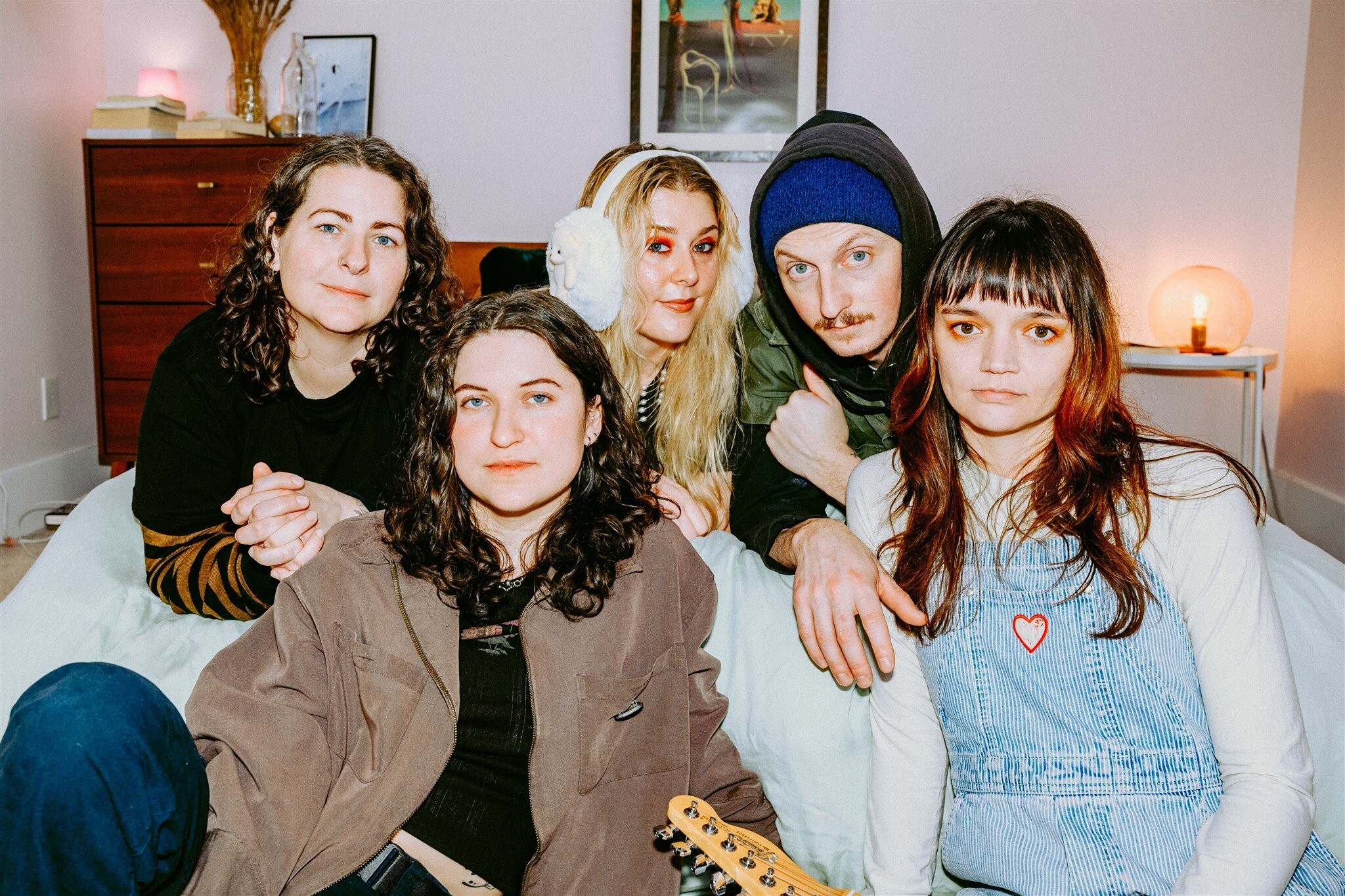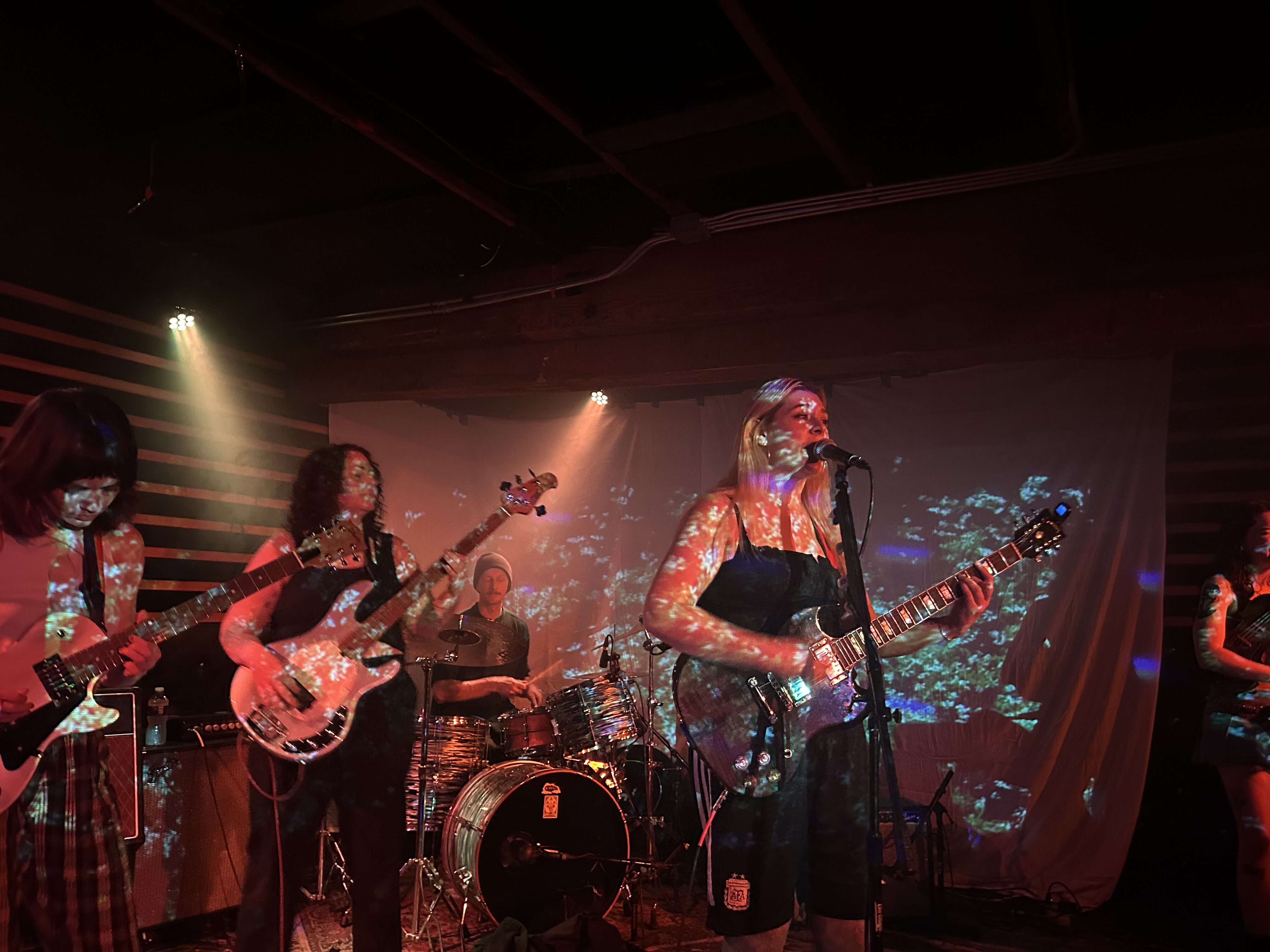Music Review
All the Angels are Dreaming of Dining Dead
All the Angels are Dreaming of Dining Dead

At 9 p.m. on Friday night, an animated crowd took over Ballard’s Sunset Tavern to celebrate the release of Seattle band Dining Dead’s sophomore album, Is This A House? Friends, family and local music fans communed over 10 dollar gin and tonics; the sounds of reunion and introduction echoed through the bar as Seattle’s music scene collided in one big tattooed family. A line out the door gave way to pockets of people smoking on the street, and a pitbull mix puppy named Petey made the rounds, enjoying the love fest (if you were there, you probably had the pleasure of giving Petey a treat—or two).
In the back through a set of double doors, the venue was growing increasingly crowded. Two opening acts, Sarah not Sarah, and the punk political girl group, Cat Valley, got the room warmed up. Cat Valley in particular made things toasty with their song “My Body”, which involved an audience scream-along of the lyrics, “My body, my choice.” When Dining Dead took the stage around 10:45 p.m., the whole place was vibrating.
They played the new album top-to-bottom, a tight 40 minutes starting with the track “Overture”: a true introduction that offers up a sampler of everything you can expect from Dining Dead. Drummer Bogie Pieper and bassist Shannon Barberry set up a dynamic throughline of tempo, while lead guitarist Emma Hayes bites off intricate guitar riffs and jams effortlessly with the ensemble. It’s more a collection of moments than a traditional song, a structural inversion that becomes a recurring theme on Is This A House?

“All the angels are dreaming of me,” lead vocalist and songwriter Sammy Skidmore intones on this first track. “I can’t be who you want me to be.”
Skidmore’s voice is the lovechild of P.J. Harvey and the Cranberries’s Dolores O’Riordon, a restrained mix of delicate femininity and raw fierceness that threatens to spill over, leaving the audience unsure whether she’ll break out in a scream or a yodel. What you find in the middle is a beautiful, tender thing. Paired with Skidmore’s vocal prowess is the violin and backing vocals of Kennedy Webb, whose performance on strings adds a lilt of traditional Celtic energy throughout the album.
Skidmore’s first proclamation, “I can’t be who you want me to be,” feels like a conflict that is central to the album, one that recurs throughout the tracklist, from its word-for-word reprise on “Heaven from the Ceiling”, to the more ambiguous moments of questioning the self as it relates to someone else’s expectations. Songs like “Against the Wall” and “Angel of Logic” are playful and rebellious anthems, whereas “Evaporate” and “Interlude” present moments of mounting tension, both sonically and lyrically. On “Interlude”, a woman can be heard saying, “I didn’t even recognize that person.” It’s a snippet from a voicemail left to Skidmore by her grandmother after she’d seen a photo of Skidmore where she looked “thinner”. Her voice repeats, this offhanded comment growing more and more distorted until it is indistinguishable from the carefully meandering path of Hayes’s guitar solo.
Dining Dead was formed by childhood friends and Seattleites Skidmore and Hayes, who met at a local summer camp in seventh grade and bonded over a shared love of music, namely The Pixies and The Shins. They reconnected in 2018 when Skidmore moved back to Seattle after stints in Hawaii, New York, and Dallas. The pair then collected talented drummer Pieper, Hayes’s roommate at the time, who wanted in after hearing them jamming together. Barberry and Webb were added later, found through mutual friends and Instagram dms. Hailing from the South, Barberry and Webb both brought an eclectic mix of folk-country and funk. Today, the quintet feels like a solid entity, the sort of band whose wordless communication is palpable both on and off the stage.
At Sunset, the few pauses between songs beckoned hoots and hollers from the amped-up crowd. A group of dudes in the back could be heard yelling, “Let’s go Bogie!” from time to time, showing appreciation for the band’s only guy; others made noise for Barberry’s funky bassline and Webb’s violin chops.
After “Interlude”, the show took a turn toward the aggressive, rock-y side of things. Songs like “Burn Your Dinner” and “Goddamnit” were instant crowd-pleasers: “When my ears aren’t full of sound, they hurt — goddamnit!,” sang Skidmore, the “goddamnit” part punctuated with the help of Webb’s backing vocals and the now sufficiently hyped audience who stomped and grooved along to the push-pull moments of tempo manifesting before them.
The title of the album, Is This A House?, is a sort of summation of Dining Dead and Skidmore’s internal conflicts: questioning one’s identity through early adulthood, and perhaps losing certain parts of the self through the process of becoming. The tension present in the music—a push-pull between clarity and confusion, realization and relapse—mimics the ups and downs of our real life struggles with these questions, as Skidmore asks herself from track to track: can she be who you want her to be? It’s this forthright reckoning with uncertainty that makes this band so interesting to listen to. Undone and raw, yet expertly crafted, Dining Dead is ready to make you feel everything—and then some.
Dining Dead's sophomore album, Is This A House?, is available on streaming platforms everywhere. The band will embark on their first ever East Coast tour this May, and will play the Neumos stage at Capitol Hill Block Party in July. Read more about the band here, or go to @diningdeadmusic.